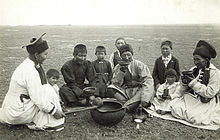
Back Kalmikiërs AF Calmucos AN قلميقيون Arabic Pueblu calmucu AST Kalmıklar AZ کالمیکلار AZB Ҡалмыҡтар BA Калмыкі BE Калмики Bulgarian Хальмагууд BXR
Хальмгуд/Xaľmgud | |
|---|---|
 Kalmyks in the late 19th century. Picture taken in the Salsky Raion of the Don Host Oblast | |
| Total population | |
| c. 195,000 | |
| Regions with significant populations | |
| 179,547[1] | |
| 12,000[2] | |
| 325[3] | |
| 3,000[4] | |
| Languages | |
| Kalmyk Oirat, Russian | |
| Religion | |
| Predominantly Tibetan Buddhism Minority Russian Orthodox Christianity, Tengrism, Mongolian shamanism, Islam[5] | |
| Related ethnic groups | |
| Mongols, especially Oirats, other Mongolic peoples | |
Kalmyks (Kalmyk: Хальмгуд, Xaľmgud; Mongolian: Халимагууд, romanized: Khalimaguud; Russian: Калмыки, romanized: Kalmyki; archaically anglicised as Calmucks) are the only Mongolic-speaking people living in Europe, residing in the easternmost part of the European Plain.
This dry steppe area, west of the lower Volga River, known among the nomads as Itil/Idjil, a basin on the northwest shore of the Caspian Sea, was the most suitable land for nomadic pastures. Itil or Idjil, the ancient name of the Volga River, written in the archaic Oirat script, means exactly that: the "pastures".[6][full citation needed]
The ancestors of Kalmyks were nomadic groups of Oirat-speaking Mongols, who migrated from Western Mongolia to Eastern Europe three times: in early medieval times, establishing in the 6th–8th centuries the Avar Khanate; in medieval times, establishing the Ulus of Juchi and Il-Kanate as Khuda-in-laws of Genghis Khan;[7] and finally, in early modern times, establishing the Kalmyk Khanate in the 17th century.[8][9]
The Oirat language belongs to the western branch of the Mongolic language family, whose speakers include numerous sub-ethnic groups (Derbet, Torgut, Khoshut, Olot, Dzungar (Zunghar), Bayad, Zakhchin, Khoton, Myangad, Buzava) across a wide geographical area of Uvs and Khovd provinces (aimags) of Western Mongolia (N = 209,412), and in Xinjiang Uygur Autonomous Region, China (N = 194,891). Ethnic groups of Oirat speakers in the Republic of Kalmykia, Russia (N = 162,740[10]) include Torguts, Derbets and Buzavas, together with a smaller group called Khoshuts, who live in just two villages of Kalmykia. Up until today the Kalmyks have retained their distinguished sub-ethnic groups, being quite separated from their geographical neighbours in Russia and northeast Caucasus.[11]
The Kalmyks are the only traditionally Buddhist ethnic group who are located inside Europe. Through emigration, small Kalmyk communities have been established in the United States, France, Germany, and the Czech Republic.[12]
- ^ https://rosstat.gov.ru/storage/mediabank/Tom5_tab1_VPN-2020.xlsx. All Russian census, 2021
- ^ "PRESIDENT.MN". Archived from the original on 6 December 2016. Retrieved 4 December 2016.
- ^ State statistics committee of Ukraine – National composition of population, 2001 census (Ukrainian)
- ^ Guchinova, Elsa-Blair M. (Fall 2002). "Kalmyks in the United States". Anthropology & Archeology of Eurasia. 41 (2): 8. doi:10.2753/AAE1061-195941027. S2CID 144027029. Retrieved 2023-04-25.
- ^ Содномпилова, М.М.; Нанзатов, Б.З. Культурное наследие народов Центральной Азии. Выпуск 3: сборник статей. Imbt. p. 34. ISBN 9785792503649. Retrieved 2014-10-25.
- ^ Oirat-Kalmyk dictionary, 1977
- ^ Juvaini, A-M. (1997). Genghis Khan: the history of the world conqueror. Manchester, UK: Manchester Univ. Press.
- ^ "Origins of the Avars elucidated with ancient DNA". Max-Planck-Gesellschaft. April 1, 2022.
- ^ Bougdaeva, Saglar (2024). "The Yelu Language of War and Peace: A Revised Oirad Translation of the Altai Runic Inscriptions (6th–9th centuries)". Central Asiatic Journal. 66 (1–2): 27–46.
- ^ "Впн-2010".
- ^ Balinova, Natalia; Post, Helen; Kushniarevich, Alena; Flores, Rodrigo; Karmin, Monika; Sahakyan, Hovhannes; Reidla, Maere; Metspalu, Ene; Litvinov, Sergey; Dzhaubermezov, Murat; Akhmetova, Vita; Khusainova, Rita; Endicott, Phillip; Khusnutdinova, Elza; Orlova, Keemya; Bakaeva, Elza; Khomyakova, Irina; Spitsina, Nailya; Zinchenko, Rena; Villems, Richard; Rootsi, Siiri (September 2019). "Y-chromosomal analysis of clan structure of Kalmyks, the only European Mongol people, and their relationship to Oirat-Mongols of Inner Asia". European Journal of Human Genetics. 27 (9): 1466–1474. doi:10.1038/s41431-019-0399-0. PMC 6777519. PMID 30976109.
- ^ Kalmyks Archived 2007-09-27 at the Wayback Machine, NUPI – Centre for Russian Studies